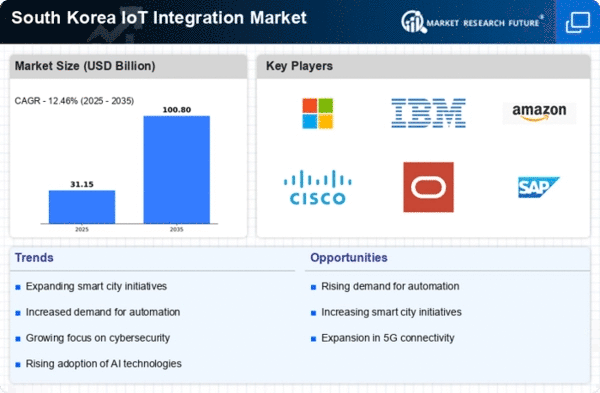Rising Demand for Automation
The increasing demand for automation across various sectors in South Korea is a pivotal driver for the iot integration market. Industries such as manufacturing, logistics, and healthcare are actively seeking to enhance operational efficiency through automated processes. This trend is reflected in the projected growth of the automation market, which is expected to reach approximately $10 billion by 2026. As businesses recognize the potential of IoT solutions to streamline operations, the integration of IoT solutions becomes essential. The iot integration market is thus positioned to benefit from this shift towards automation, as companies invest in smart devices and systems that facilitate real-time data exchange and decision-making.
Expansion of 5G Infrastructure
The rollout of 5G technology in South Korea is significantly influencing the iot integration market. With its high-speed connectivity and low latency, 5G enables a vast array of IoT applications, from smart homes to industrial automation. The South Korean government has committed substantial resources to enhance 5G infrastructure, with investments exceeding $2 billion in recent years. This expansion is expected to facilitate the deployment of IoT devices, leading to an estimated growth of the iot integration market by 25% annually. As more devices connect seamlessly, the demand for effective integration solutions will likely surge, driving innovation and competition within the market.
Increased Focus on Data Analytics
The growing emphasis on data analytics in South Korea is a crucial driver for the iot integration market. Organizations are increasingly leveraging IoT-generated data to gain insights and improve decision-making processes. The analytics market is projected to grow by 30% over the next five years, indicating a strong demand for integrated IoT solutions that can process and analyze large volumes of data. This trend suggests that businesses are recognizing the value of data-driven strategies, which in turn propels the need for effective integration of IoT systems. Consequently, the iot integration market is likely to see a surge in demand for platforms that facilitate data collection, analysis, and visualization.
Investment in Smart Infrastructure
The South Korean government's investment in smart infrastructure is a key driver for the iot integration market. Initiatives aimed at developing smart cities and enhancing urban living conditions are gaining momentum, with funding exceeding $3 billion allocated for smart infrastructure projects. These projects often involve the integration of IoT technologies to improve transportation, energy management, and public safety. As cities evolve into smart environments, the demand for effective integration solutions will likely increase, fostering growth in the iot integration market. This trend indicates a long-term commitment to leveraging IoT for urban development, which could reshape the landscape of the market in the coming years.
Growing Consumer Awareness of Smart Technologies
Consumer awareness regarding smart technologies is on the rise in South Korea, which serves as a significant driver for the iot integration market. As individuals become more informed about the benefits of IoT devices, such as energy efficiency and enhanced convenience, the adoption rate is expected to increase. Recent surveys indicate that over 60% of South Koreans are interested in smart home solutions, which could lead to a market expansion worth $5 billion by 2027. This heightened interest in smart technologies necessitates robust integration solutions to ensure seamless operation and interoperability among various devices, thereby propelling the growth of the iot integration market.
















